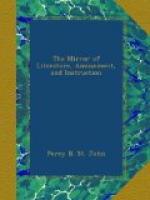had burnt up the verdure. The spirit of
Robert
le Diable is supposed to haunt the cavern in the
form of a wolf, and advances uttering piteous cries,
and steadfastly gazing on its place of defence (the
caverns extending to the River Seine) reviews his
former glory and conquests, and seems bitterly to
lament the present decay. In vain the peasants
commence the chase; they assert that the wolf though
closely pursued always eludes the vigilance of the
huntsman. On the death of Richard I. of England,
1199, his Brother John was proclaimed King of Normandy
and Aquitaine; the Duchies of Brittany, the Counties
of Anjou, Maine, Tours and others, acknowledged Arthur,
John’s nephew, as their sovereign, and claimed
the protection of the King of France, Philip II.,
surnamed Augustus; but he despairing of being able
to retain these provinces against the will of their
inhabitants, sacrificed Arthur and his followers to
John, who in a skirmish with some of the Norman Lords,
carried them all prisoners into Normandy, where Arthur
soon disappeared: the Britons assert that he was
murdered by his uncle; and the Normans that he was
accidentally killed in endeavouring to escape.
The death of their favourite Prince stung the Britons
to madness, as in him centered their last hope of
regaining independence: an ardent imagination
led them to believe their future destiny connected
with this child, which inspired them with a wild affection
for Philip, as being the enemy of his murderer.
They accused John before the French King of Arthur’s
murder, and he was summoned as a Vassal of Normandy
to appear and defend himself before the twelve Peers
of France. This command being treated with contempt,
the lands John held under the French crown were declared
forfeit, and an army levied to put it into execution.
It was on this emergency that John found a safe place
of concealment in the cavern of Robert the Devil.
* * * *
*
Laconics, &c.
(Continued from page 53.)
Generosity is not the virtue of the multitude, and
for this reason: selfishness is often the consequence
of ignorance, and it requires a cultivated mind to
discern where the rights of others interfere with our
own wishes.
If commerce has benefited, it has also injured the
human race; and the invention of the compass has brought
disease as well as wealth in its train.
The days of joy are as long and perhaps as frequent
as those of grief; but either the memory is treacherous
or the mind is too morbid to admit this to be the
case.
Without occasional seriousness and even melancholy,
mirth loses its magic, and pleasure becomes unpalatable.
It is unlucky that experience being our best teacher,
we have only learnt its lessons perfectly, when we
no longer stand in need of them; and have provided
ourselves armour we can never wear.
Chastity in women may be said to arise more from attention
to worldly motives than deference to moral obligation:
there is not so much continence amongst men, because
there is not the same restriction.




